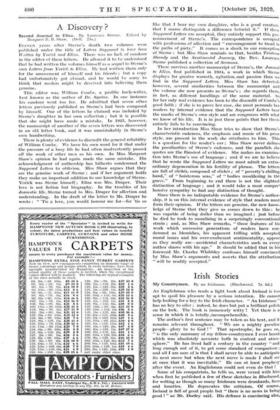Irish Stories
My Countrymen. By an Irishman. (Blackwood. 7s. 6d.)
AN Englishman who reads a light book about Ireland is too apt to spoil his pleasure by a serious intention. He cannot help looking for a key to the Irish character. "An Irishman" has no key to offer ; indeed, he does but put a brilliant polish on the lock. The book is immensely witty ! Yet there is a sense in which it is totally,incomprehensible.
The author's first sentence may be taken as his text, and it remains relevant throughout. "We are a mighty peculiar people-glory be to God ! " That apostrophe, he goes on, "is the only summary of my fellow-countrymen I ever heard which was absolutely accurate both in content and atmo- sphere." He has lived half a century in the country "and long enough out of it, to get some standard of comparison ; and all I am sure of is that I shall never be able to anticipate its next move but when the next move is made I shall see at once that it was inevitable." He can at least prophesy after the event. An Englishman could not even do that Some of his compatriots, he tells us, were vexed with him when first he published a few of these sketches in Blackwood, for writing as though so many Irishmen were drunkards, liars and lunatics. He deprecates the criticism. Of course, Ireland is full of good people but t` there is no news in being good I "- as Mr. Dooley said. His defence is convincing also, on a further score. He makes us like the people whom he accuses. In another context he claims that he is "too much an Irishman to be misled by mere evidence," and with extra- ordinary skill he puts his reader into a like position. He cajoles us into tolerance. "If there were not that sort, there would not be all sorts," we find ourselves saying with one of his characters. Good, bad and indifferent, drunk or sober, they have such a charming way of putting things ! A farmer who was taken for his first run in a motor-car "began by adjuring the driver to 'let the oul thing rip,' but as the speed rose past thirty miles an hour he extended a checking hand, and said, That'll do, misther, that'll do. Don't put me out of consate wid me little ass.'" Again, there is a guilelessness about their self-interest which robs it of more than half its objection ; witness the following postscript which ends a letter from an applicant for a Government dole : "If my just claim is not allowed I hold myself free to withdraw and deny any statement I have made in this letter."
Some few of the religious stories here told might, we think, have been omitted, but they will not give more offence to one party than another. The writer poses as a complete Galli° and tells with equal zest of Catholic and Protestant fanaticism. A woman complained that after being told that "we would all be free when we got a parlyment of our own," she yet saw "the Prodestan minister goin round loose the same as ever." A Protestant, on being indignantly informed that on the staff of a certain Corporation employing hundreds of clerks there were three Catholics, replied in perfect good faith that he was a member of the Corporation himself and would do his best to get the three men sacked.
To our minds one of the funniest stories in the book relates to a football match, played "Catholics against Protestants." The Catholics won. A defeated player going home was heard to say sadly that there would be " rejoicin at the Vatican to-night."
The Englishman, instinctively judging of importance by success, never ceases to be amused at the Irishman's estimate of his own importance ! But on second thoughts, the English- man must admit that in any little company of ordinary English people found together at a house party, at a com- mittee, or on a ship, an Irishman among them counts for two ! They may be unimportant ; they are never in- significant.



















































 Previous page
Previous page